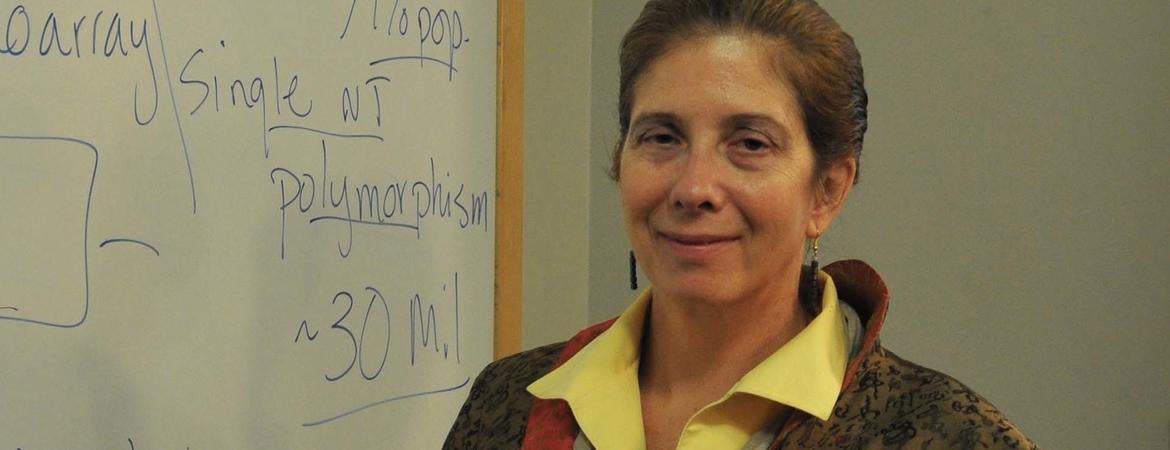
RIVERSIDE, CA - Aside from identical twins, no two individuals are completely identical genetically. Most differences between individuals are due to single nucleotide changes or polymorphisms (SNPs) — DNA sequence variations — in the genome.
SNPs, the most common type of genetic variation among people, are being increasingly recognized as playing a major role in phenotype variations, such as eye and hair color, basal body weight, muscle tone, responsiveness to alcohol consumption, as well as susceptibility to diseases such as cancer, diabetes, heart disease and mental disorders.
The more scientists know what SNPs’ functions are, the easier it would be to understand the tremendous variability in individuals’ responses to drug treatments such as why some drugs are life-saving for some people but cause serious side effects in others.
Frances Sladek, a professor of cell biology and toxicologist at the University of California, Riverside, has received a $1.5 million grant from the National Institute of Diabetes and Digestive and Kidney Diseases of the National Institutes of Health to support a four-year research project that will allow her to examine the effect SNPs have on a special class of proteins called nuclear receptors that bind DNA and regulate the expression of many important genes in response to hormones, vitamins and drugs.
“Many SNPs introduce structural or functional changes in the proteins encoded by genes,” explained Sladek, the grant’s principal investigator. “Other SNPs, the vast majority, are outside of the protein-coding portion of the gene; they are often found in the regulatory regions of genes — regions that determine the level of gene expression. We will characterize both types of SNPs to help predict disease susceptibility and response to drug treatments. Such a characterization will help lay the foundation for personalized medicine, ultimately leading to more effective and hence less costly health care costs.”
Sladek’s lab will use a powerful new technology, called protein binding microarrays, to identify SNPs in DNA sequences to which nuclear receptors bind. By integrating a range of biochemical, molecular, genomic and bioinformatics approach, the researchers will examine nuclear-receptor-DNA binding and how SNPs influence it.
The team will make publicly available all their results on a UC Riverside website dedicated to the project, as well as on other public databases. The researchers are also developing web-based tools for target gene prediction, an evolving science of efficiently identifying the regions of genomic DNA that regulate the expression of genes.
“We hope these tools will advance the long-term goal of fast-tracking research linking nuclear receptors to disease and drug metabolism, and thereby help personalize medicine and ensure that drugs that target nuclear receptors can be used in a more effective fashion,” Sladek said.
DNA, situated in the cell’s nucleus, carries the genetic information of a cell and consists of thousands of genes. Each gene serves as a recipe on how to build a protein molecule. Proteins perform important tasks for the cell functions or serve as building blocks. When proteins are needed, the corresponding genes are made into RNA (single-stranded molecules that can adopt very complex three-dimensional structures) via a process called transcription for which proteins, called transcription factors, are needed. Nuclear receptors are transcription factors that regulate the expression of a wide range of genes involved in nearly all aspects of human physiology and disease.
“We have much to learn about the nuclear-receptor-DNA interaction and the factors that influence it,” Sladek said. “While nuclear receptors have been investigated heavily for their role in physiology and disease and are themselves targets of many successful drugs, we still do not have a complete understanding of their role in disease susceptibility nor in individual responses to drug treatments. This grant will allow us to better define what kind of sequences the nuclear receptors bind to, and help with other ways of examining what kind of genes the nuclear receptors regulate.”
Sladek will be joined in the research by the following colleagues at UCR: Tao Jiang, a professor of computer science and engineering and the grant’s co-principal investigator; Thomas Girke, an associate professor of bioinformatics; and two postdoctoral researchers.
Original article on UCR Today